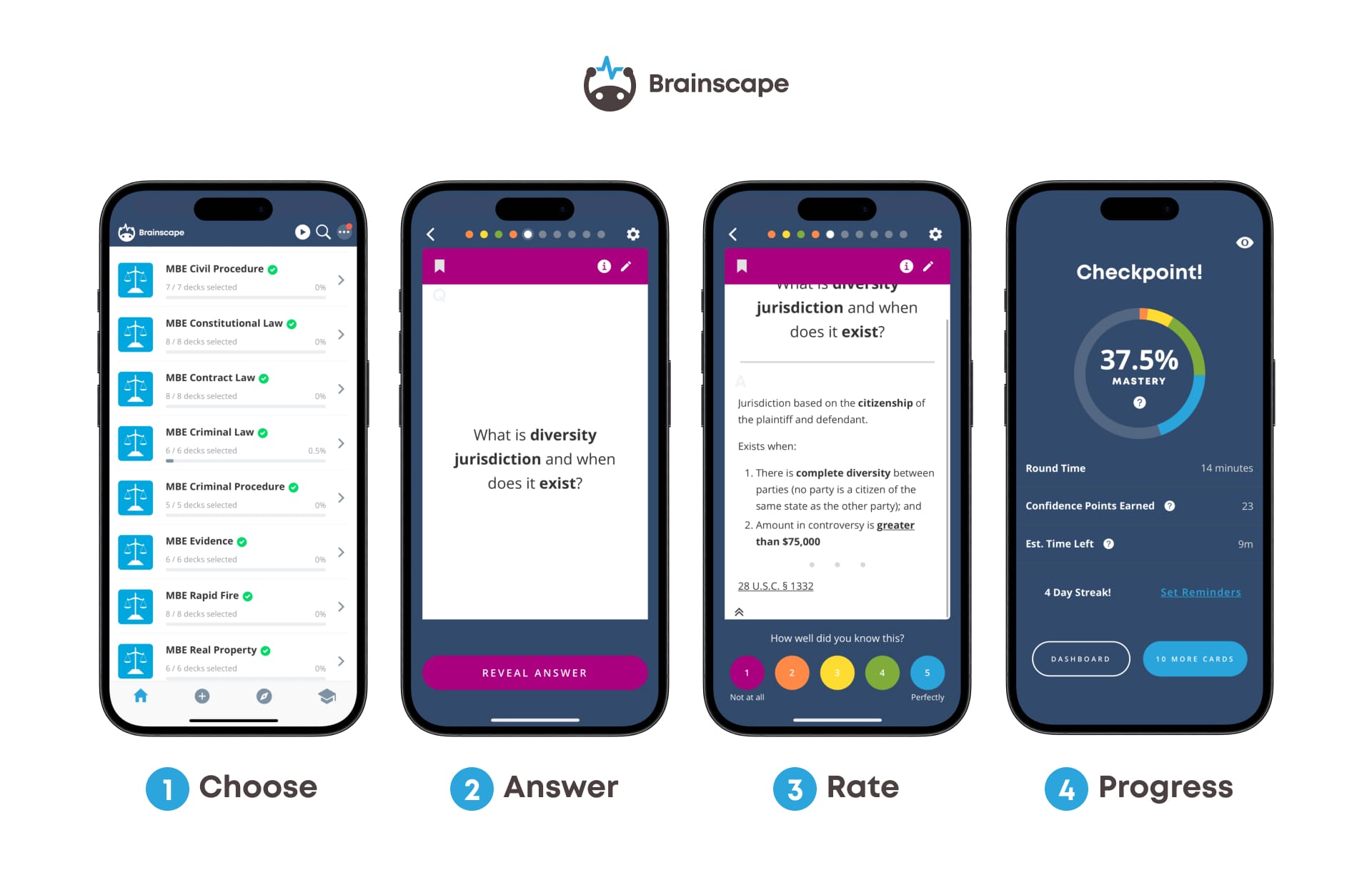Congratulations on embarking on the journey to conquer the Bar Exam—a formidable milestone in your legal career. Unlike typical law school exams, the Bar Exam demands a comprehensive understanding of a vast array of legal subjects. Success requires not only memorization but also the ability to apply legal principles under pressure.
The good news? With strategic preparation, you can navigate this challenge effectively. Let's explore the best practices to optimize your study regimen and set you on the path to passing the Bar Exam.
The reason many smart students fail is because they focus on only one or two pieces of the formula—but not all of them. In particular, students who fail tend to focus more on listening to lectures and learning the law than on memorizing it.
This makes sense—law school teaches you how to think about and apply the law, but it doesn’t teach you how to memorize and regurgitate it. Unfortunately, the bar doesn’t care how sophisticated your legal reasoning is. The bar cares how well you can recall the black letter law and apply it in a formulaic way.
That’s where Brainscape comes in. We've collected the best bar exam tips to get you over this hurdle and painstakingly curated and vetted a collection of adaptive MBE flashcards for web and mobile. These use spaced repetition to ingrain the highest-yield concepts in the NCBE test plan and popular bar prep courses like BarBri, Themis, Kaplan, Adaptibar, BarMax, Critical Pass, and others. In other words, no matter which bar prep provider you use, we've got you covered!

Brainscape's certified MPRE and MBE flashcards are scientifically tailored to streamline learning and retention, which means you’ll ingrain the material quicker, remember it longer, and enjoy yourself along the way.
Study Strategies for Mastering Bar Exam Subjects
Tackling the breadth of material covered in the Bar Exam necessitates a structured approach:
- Create a Detailed Study Schedule: Outline a plan that covers all subjects, allocating time based on your strengths and weaknesses. Starting early and adhering to a consistent schedule can alleviate last-minute cramming.
- Focus on Breadth Over Depth: Aim for a broad understanding of all tested subjects rather than an in-depth mastery of a few. This strategy ensures you're prepared for the wide range of topics the exam may cover.
- Utilize Active Learning Techniques: Engage with the material through practice questions, summarizing information in your own words, and teaching concepts to others. Active engagement enhances retention and comprehension.
How to Utilize Bar Exam Flashcards Effectively

Flashcards are a powerful tool for reinforcing knowledge and identifying areas needing improvement:
- Adopt Spaced Repetition: Use flashcards that employ spaced repetition algorithms to enhance long-term retention. This method involves reviewing information at increasing intervals, which strengthens memory.
- Choose Comprehensive Flashcard Sets: Select flashcards that cover all essential topics and are designed to complement leading bar prep courses. Brainscape, for instance, offers a set of 2,600+ flashcards that align with major bar review programs.
- Engage in Active Recall: When using flashcards, attempt to recall the answer before flipping the card. This practice strengthens memory and enhances understanding.
The Role of Practice Exams in Bar Preparation
Simulating exam conditions through practice tests is crucial:
- Take Full-Length Practice Exams: These help build endurance and familiarize you with the exam's format and timing. Aim to replicate test conditions as closely as possible.
- Analyze Your Performance: After each practice exam, review your answers thoroughly to understand mistakes and identify patterns in your performance.
- Focus on Weak Areas: Use insights from practice exams to allocate more study time to subjects or question types where you're underperforming.
Managing Stress and Maintaining Well-Being
Your mental and physical health significantly impact your study effectiveness:
- Incorporate Regular Breaks: Implement techniques like the "Pomodoro Technique," studying for 25-30 minutes followed by a 5-minute break, to maintain focus and prevent burnout.
- Maintain a Healthy Lifestyle: Prioritize adequate sleep, balanced nutrition, and regular physical activity to support cognitive function and overall well-being.
- Seek Support: Communicate with family and friends about your study commitments, and don't hesitate to reach out to peers or mentors for guidance and encouragement.
FAQ: How to Study for the Bar Exam More Efficiently
What is the best way to study for the bar?
The most effective bar prep involves a mix of memorization, practice, and time management. This means combining active recall methods like flashcards with regular practice exams and reviewing your weak areas consistently. Tools such as Brainscape that integrate spaced repetition and metacognition can help you absorb and retain a large volume of material more efficiently.
What is the best way to study for law exams?
Law exams reward both comprehension and clarity. The best approach involves outlining key rules, applying them to practice problems (especially past essay prompts), and honing IRAC (Issue, Rule, Application, Conclusion) writing skills. Start early, test yourself regularly, and focus on the structure and analysis more than flashy language.
How long does it take to study for a law exam?
Bar prep typically requires 8 to 10 weeks of full-time study, but for law school exams specifically, 2 to 3 weeks of focused preparation per subject is common. The exact time depends on your familiarity with the material, your study methods, and whether you're balancing other responsibilities. Consistency and quality of study often matter more than sheer hours logged.
FAQ: Why You May Be Doing Mobile Learning Wrong
How does mobile learning affect students?
Mobile learning gives students the ability to access study materials anytime, anywhere, which can improve engagement and flexibility. When used effectively, it promotes consistent review, bite-sized learning, and on-the-go reinforcement, but it works best when paired with motivation and well-designed content.
Why is mobile learning important?
Mobile learning supports modern learners’ need for flexibility and immediacy. It allows organizations and individuals to deliver or access training in real-time, reinforce knowledge continuously, and make learning more accessible in busy, fast-paced environments. When aligned with the right goals, it enhances both performance and retention.
What is the background of the study of mobile learning?
Mobile learning emerged alongside the growth of smartphones and app ecosystems in the late 2000s. As educational content shifted from static, desktop-based formats to more dynamic, accessible ones, researchers and learning professionals began exploring how mobile delivery could support microlearning, self-paced study, and just-in-time knowledge application across corporate, academic, and personal contexts.
Final Thoughts on Bar Exam Preparation
Success on the Bar Exam is the result of strategic planning, disciplined study, and self-care. By creating a comprehensive study schedule, utilizing effective tools like flashcards, engaging in regular practice exams, and maintaining your well-being, you position yourself for a favorable outcome.
Remember, the journey to passing the Bar Exam is a marathon, not a sprint. Stay committed, be adaptable, and believe in your ability to achieve this significant professional milestone.
Best of luck on your path to becoming a licensed attorney!
Additional Reading
- How to deal with bar exam stress
- How hard is the bar exam—and how can you make it easier?
- The best bar exam apps for law students
References
Ahrberg, K., Dresler, M., Niedermaier, S., Steiger, A., & Genzel, L. (2012). The interaction between sleep quality and academic performance. Journal of Psychiatric Research, 46(12), 1618-1622. https://doi.org/10.1016/j.jpsychires.2012.09.008
Álvarez-Bueno, C., Pesce, C., Cavero-Redondo, I., Sánchez-López, M., Garrido-Miguel, M., & Martínez-Vizcaíno, V. (2017). Academic achievement and physical activity: A meta-analysis. Pediatrics, 140(6), e20171498. https://doi.org/10.1542/peds.2017-1498
Howie, E. K., Schatz, J., & Pate, R. R. (2015). Acute effects of classroom exercise breaks on executive function and math performance: A dose–response study. Research Quarterly for Exercise and Sport, 86(3), 217-224. https://doi.org/10.1080/02701367.2015.1039892
Hyseni Duraku, Z. & Hoxha, L. (2018). Self-esteem, study skills, self-concept, social support, psychological distress, and coping mechanism effects on test anxiety and academic performance. Health Psychology Open, 5(2), 2055102918799963. https://doi.org/10.1177%2F2055102918799963
Karpicke, J. D. & Roediger III, H. L. (2007). Repeated retrieval during learning is the key to long-term retention. Journal of Memory and Language, 57(2), 151-162. https://doi.org/10.1016/j.jml.2006.09.004
Klinzing, J. G., Niethard, N., & Born, J. (2019). Mechanisms of systems memory consolidation during sleep. Nature Neuroscience, 22(10), 1598-1610. https://doi.org/10.1038/s41593-019-0467-3
Malecki, C. K. & Demaray, M. K. (2006). Social support as a buffer in the relationship between socioeconomic status and academic performance. School Psychology Quarterly, 21(4), 375–395. https://doi.org/10.1037/h0084129
Mrazek, M. D., Franklin, M. S., Phillips, D. T., Baird, B., & Schooler, J. W. (2013). Mindfulness training improves working memory capacity and GRE performance while reducing mind wandering. Psychological Science, 24(5), 776-781. https://doi.org/10.1177%2F0956797612459659
Scholz, A., Ghadiri, A., Singh, U., Wendsche, J., Peters, T., & Schneider, S. (2018). Functional work breaks in a high-demanding work environment: An experimental field study. Ergonomics, 61(2), 255-264. https://doi.org/10.1080/00140139.2017.1349938
Smolen, P., Zhang, Y., & Byrne, J. H. (2016). The right time to learn: Mechanisms and optimization of spaced learning. Nature Reviews Neuroscience, 17(2), 77. https://doi.org/10.1038/nrn.2015.18
Tonetti, L., Natale, V., & Randler, C. (2015). Association between circadian preference and academic achievement: A systematic review and meta-analysis. Chronobiology International, 32(6), 792-801. https://doi.org/10.3109/07420528.2015.1049271
van der Heijden, K. B., Vermeulen, M. C., Donjacour, C. E., Gordijn, M. C., Hamburger, H. L., Meijer, A. M., ... & Weysen, T. (2018). Chronic sleep reduction is associated with academic achievement and study concentration in higher education students. Journal of Sleep Research, 27(2), 165-174. https://doi.org/10.1111/jsr.12596
